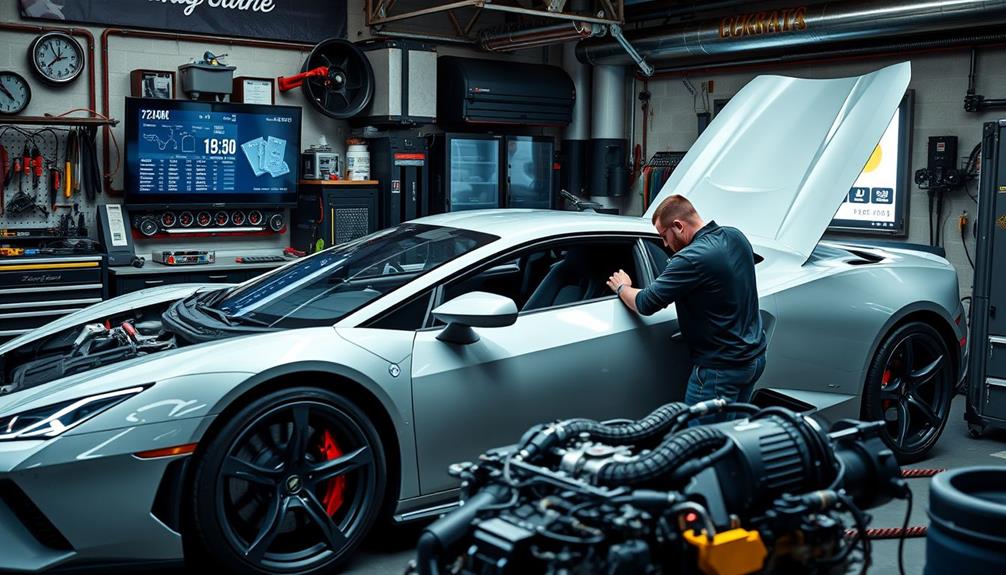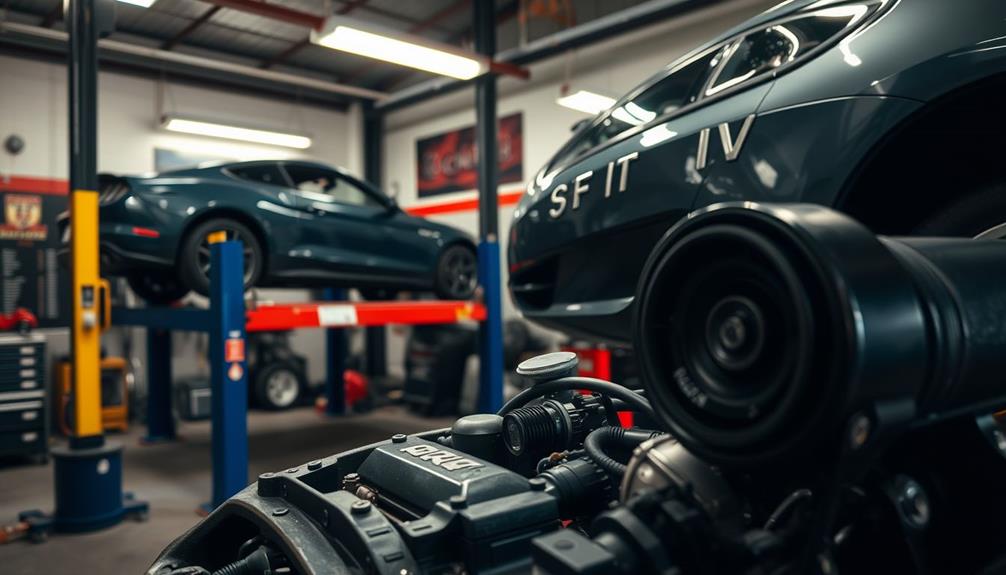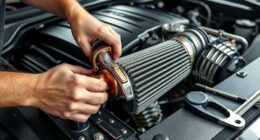Car tuning can range from 30 minutes to several days, depending on what you're upgrading. A simple ECU remap usually takes about 1-2 hours, while major changes, like installing a turbocharger, might need 8-20 hours. Expect to drive 50-100 miles after tuning for the engine control module (ECM) to adjust properly. Also, make sure you're aware of the vehicle's condition and the experience level of your tuner, as these factors can impact the timeframe. Ready to make your ride perform better? There's more to uncover about maximizing your tuning experience. It’s important to plan your car tuning timeline appropriately and communicate with your tuner about your expectations. Be prepared for some trial and error as the tuning process can involve adjustments and fine-tuning to achieve the desired performance. Additionally, be sure to schedule regular maintenance checks after the tuning to ensure that your vehicle is running smoothly and efficiently. By staying informed and proactive about the car tuning timeline, you can ensure that your vehicle performs at its best.
Key Takeaways
- Simple ECU remapping usually takes 1-2 hours, while major upgrades like turbocharger installations can take 8-20 hours.
- After tuning, driving 50-100 miles is necessary for the ECM to relearn optimal settings.
- The experience level of the tuner significantly affects the speed and accuracy of the tuning process.
- Using advanced tuning software can expedite adjustments compared to entry-level tools.
- Regular monitoring of performance metrics like STFT and LTFT ensures effective tuning and optimal engine performance.
Factors Influencing Tuning Duration
When it comes to tuning your car, several factors can influence how long the process takes. The complexity of your modifications plays a huge role; simple remaps might take just 30 minutes, but extensive upgrades could stretch for hours or even days.
You'll also need to account for the amount of fuel your tuned car will require to run properly after the adjustments. Driving 50-100 miles post-tuning is often necessary for the Engine Control Module (ECM) to learn and adjust fuel trims effectively.
Another crucial factor is the experience level of the tuner. A seasoned professional can streamline the process, completing the job faster and with more precision. In contrast, an inexperienced tuner may take longer to achieve those ideal results, making it essential to choose wisely.
Additionally, the type of tuning software used can impact the duration; advanced software typically allows for quicker adjustments compared to entry-level tools, which may require extra time for fine-tuning.
Understanding the Tuning Process

When you tune your car, understanding the timeframes involved is essential.
Several factors can affect how long the process takes, from the complexity of your modifications to the tuning methods you choose.
After tuning, don't forget that your vehicle may need a break-in period for peak performance.
Tuning Timeframes Explained
How long should you expect the tuning process to take? The answer varies widely based on the modifications you're making and your vehicle's specifics. Generally, you can break it down like this:
- Minor Adjustments: If you're just remapping your ECU with a simple tuning device, expect about 1-2 hours. It's a quick and efficient process that won't take much of your time.
- Dyno Tuning: Engaging in dyno tuning can take several hours. This includes setup time and multiple runs to gather precise performance data. It's detailed work, so make sure you're prepared for it.
- Major Upgrades: For significant upgrades, like installing a new turbocharger, the tuning can span multiple days.
You'll also want to drive your vehicle for 50-100 miles afterward to allow the Engine Control Module (ECM) to relearn ideal settings based on the new modifications.
Factors Affecting Duration
Several factors can influence how long the tuning process takes, impacting your overall experience.
First, the type of tuning you choose plays a crucial role. A standalone remap might be quicker than dyno tuning, which typically involves multiple runs for real-time data analysis. Each session on a dynamometer can last anywhere from 30 minutes to several hours.
Next, the experience of your tuner greatly affects the duration. A seasoned tuner may navigate challenges more efficiently than someone still honing their skills. Additionally, your specific performance goals can dictate how much time's needed; more complex upgrades will naturally require more time.
Don't overlook your vehicle's condition, either. If there are underlying issues like engine defects or clogged injectors, these must be addressed before effective tuning can occur, adding to the time frame.
Remember, tuning is often a gradual process, with initial adjustments taking from a few hours to several days.
Lastly, continuous learning and practice are essential for tuners. Regularly engaging in tuning projects helps them refine their skills, which can ultimately lead to a more efficient tuning process for you.
Post-Tuning Adjustment Period
The post-tuning adjustment period is a significant phase that typically requires you to drive your vehicle for about 50-100 miles. During this time, your Engine Control Module (ECM) will relearn and adjust fuel trims based on the new operating conditions. This process is essential for guaranteeing your vehicle runs efficiently and at peak performance.
Here's what happens during this adjustment period:
- Data Gathering: The ECM uses feedback from oxygen sensors to maintain an ideal air/fuel ratio. It needs time to collect accurate data for peak performance.
- Short and Long-Term Adjustments: Short Term Fuel Trims (STFT) adapt quickly to changing conditions, while Long Term Fuel Trims (LTFT) reflect accumulated data. Both need stabilization after tuning.
- Monitoring Performance: Keep an eye on live data for fuel trims during this period. This monitoring is important to confirm your vehicle operates efficiently and within the desired performance parameters.
Common Upgrades and Their Timeframes
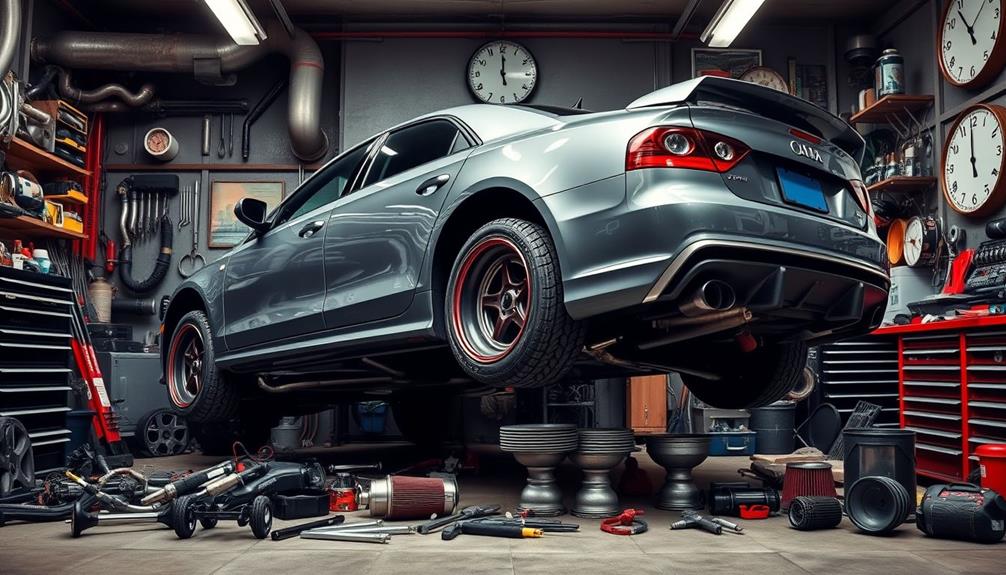
When you're considering common upgrades for your car, knowing the expected installation time can help you plan accordingly.
For performance air filters and cat-back exhaust systems, you can typically expect installation to take between 1 to 3 hours, depending on your vehicle and the complexity of the parts involved.
If you're opting for ECU remapping or tuning, set aside 1 to 4 hours, as this process requires connecting to your car's diagnostic port and adjusting multiple settings for peak performance.
Installing a turbocharger or supercharger kit is a more extensive project, usually taking between 8 to 20 hours due to necessary modifications to the engine and its systems.
If you're focusing on your suspension, upgrades like coilovers or enhanced shocks generally need about 2 to 5 hours, influenced by your vehicle type and the condition of existing components.
Finally, for brake upgrades, including performance brake pads and rotors, expect around 2 to 4 hours for installation, with additional time needed for proper bedding-in procedures.
Planning ahead will guarantee you're ready for each upgrade's time commitment!
The Role of ECM Learning
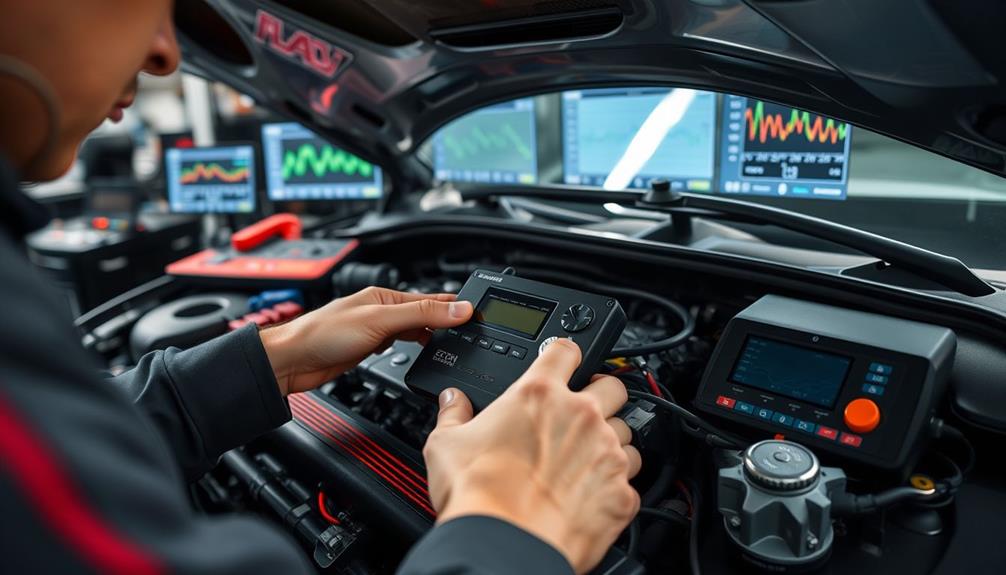
When you tune your car, the Engine Control Module (ECM) needs time to learn and adjust to the new settings.
During your first 50-100 miles of driving, it fine-tunes fuel delivery through Short Term and Long Term Fuel Trims based on real-time feedback from sensors.
Your driving conditions can greatly impact how quickly and effectively the ECM recalibrates, making this learning process essential for ideal performance.
ECM Learning Process
Understanding the ECM learning process is essential for optimizing your vehicle's performance after tuning. The Engine Control Module (ECM) needs to gather data from oxygen sensors to maintain the ideal air/fuel ratio of 14.7 during closed-loop operation.
After tuning, it typically takes about 50-100 miles of driving for the ECM to relearn new settings effectively.
During this process, you can expect:
- Immediate Adjustments: Short Term Fuel Trims (STFT) provide quick fuel delivery adjustments based on current conditions.
- Ongoing Calibration: Long Term Fuel Trims (LTFT) store accumulated STFT data, helping the ECM adapt over time.
- Reset Necessity: Resetting the ECM after significant changes clears LTFTs, allowing the system to recalibrate accurately to new parameters.
Maintaining LTFTs close to zero is ideal, as this indicates the ECM has effectively adjusted to the new tuning conditions.
By understanding the ECM learning process, you can guarantee your vehicle performs at its best, maximizing the benefits of your tuning investment.
Keep an eye on your driving habits during this adaptation phase to help facilitate the ECM's learning.
Fuel Trim Adjustments
After the ECM has gone through its learning process, fuel trim adjustments play a significant role in ensuring your vehicle runs smoothly and efficiently.
The Engine Control Module uses feedback from oxygen sensors to maintain an excellent air/fuel ratio of 14.7 in closed loop mode. Short Term Fuel Trims (STFT) respond to immediate changes, while Long Term Fuel Trims (LTFT) accumulate this data over time, reflecting adjustments based on your driving habits and engine performance.
Typically, it takes about 50-100 miles of driving for the ECM to effectively relearn and adjust to new tune settings. As you drive, the ECM gathers data on fuel trims and engine behavior, allowing it to fine-tune fuel delivery.
If you make significant changes to your air/fuel systems, it's advisable to reset the ECM. This clears the LTFTs, enabling the ECM to recalibrate and learn from the new conditions.
Maintaining LTFTs close to zero is ideal for excellent engine performance. Positive or negative LTFT values indicate that adjustments are needed based on your vehicle's operational efficiency, ensuring your car runs at its best.
Driving Conditions Impact
Driving conditions greatly influence how the Engine Control Module (ECM) learns and adapts to your vehicle's new tune settings. After you make modifications, the ECM needs about 50-100 miles of varied driving to effectively recalibrate. This process is essential for achieving peak performance.
During this period, the ECM relies on data from oxygen sensors to maintain the ideal air/fuel ratio of 14.7, ensuring your tune delivers its best.
Here are three key factors that affect ECM learning:
- Driving Style: Aggressive acceleration or steady state cruising provide different feedback, impacting fuel delivery adjustments.
- Road Conditions: Hills, flat roads, and traffic all change how the ECM gathers data, affecting both short and long-term fuel trims.
- Fuel Quality: Inconsistent fuel quality can confuse the ECM, hindering its ability to make accurate adjustments and potentially degrading performance.
If you've made significant air/fuel system changes, consider resetting the ECM. This clears accumulated Long Term Fuel Trims (LTFTs), allowing for precise recalibration as the ECM learns under your specific driving conditions.
Monitoring Performance Improvements
To effectively monitor performance improvements after car tuning, you'll want to track key metrics like rear wheel horsepower (RWHP) and rear wheel torque (RWTQ). These figures will help you quantify the gains you've achieved through tuning. Additionally, using real-time data logging tools allows you to observe changes in fuel trims, air-fuel ratios (AFR), and other essential parameters before and after making adjustments.
It's imperative to perform consistent cooling periods between dyno runs to guarantee accurate measurements and avoid inaccuracies due to heat. Regular checks on Short Term Fuel Trims (STFT) and Long Term Fuel Trims (LTFT) can help assess how the engine reacts to your tuning changes. This way, you can guarantee peak performance levels.
Here's a simple table to summarize the key metrics to monitor:
| Metric | Importance | What to Track |
|---|---|---|
| RWHP | Measures overall power output | Before and after tuning |
| RWTQ | Indicates engine's torque | Baseline vs. post-tuning results |
| Fuel Trims | Guarantees peak air-fuel mix | STFT and LTFT readings |
Best Practices for Efficient Tuning
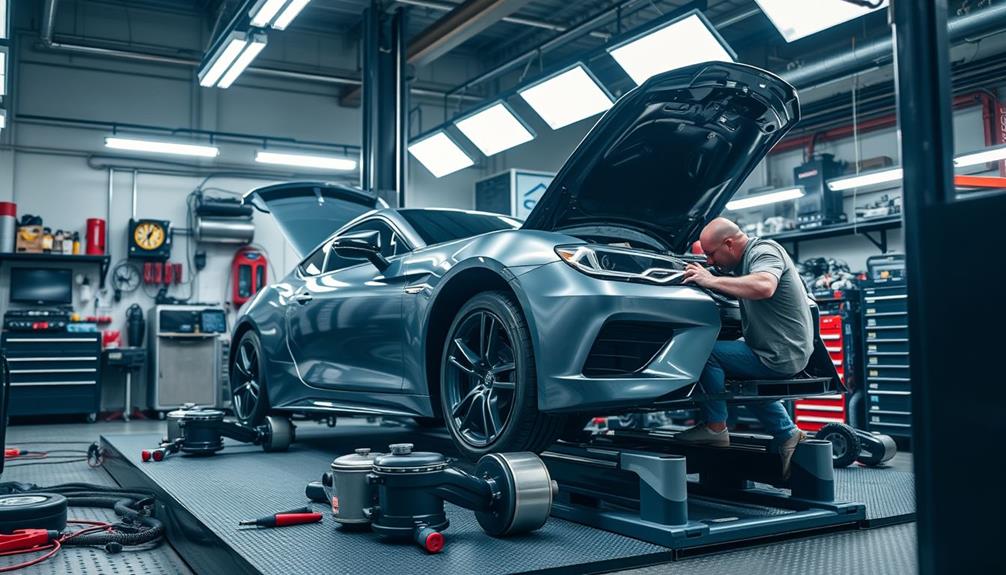
Efficient tuning hinges on a solid understanding of your vehicle's current performance parameters and the tuning software at your disposal.
To streamline your tuning process, follow these best practices:
- Collect Baseline Data: Use a dynamometer to gather baseline performance metrics. This data helps you identify specific areas for improvement and serves as a reference point for your tuning efforts.
- Monitor Engine Conditions: During tuning sessions, keep a close eye on engine temperatures and performance data. Regular monitoring prevents overheating and guarantees you're making ideal adjustments, safeguarding your engine from potential damage.
- Adopt a Systematic Approach: Tackle one modification at a time. Allow your vehicle to adapt to each change before introducing additional modifications.
This method enhances efficiency and minimizes complications, making the tuning process smoother.
Tips for Beginners in Tuning
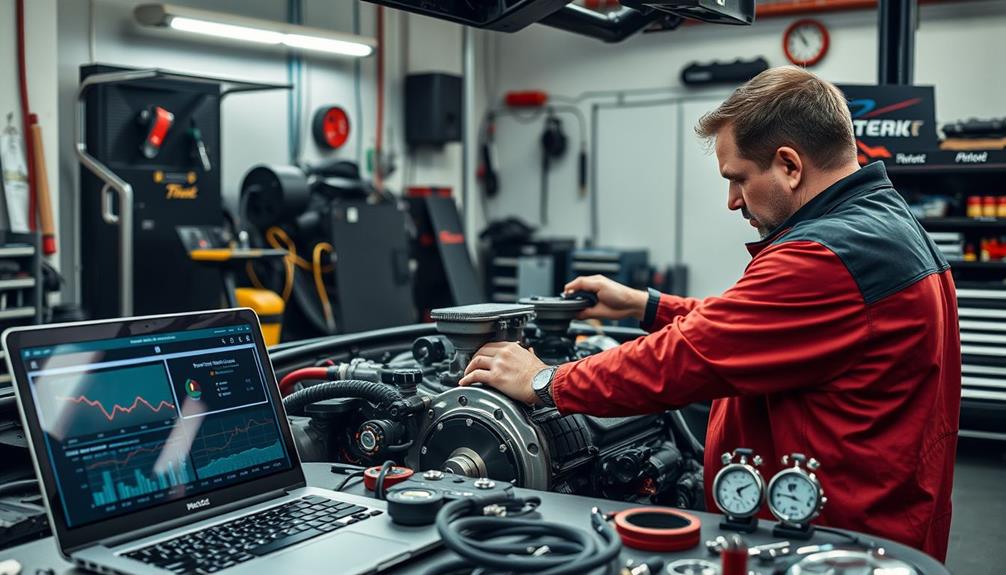
Understanding the fundamentals of tuning is essential for anyone starting out in this field. Begin by researching engine control modules (ECMs) and how they adjust fuel trims. Pay special attention to Short Term Fuel Trims (STFT) and Long Term Fuel Trims (LTFT), as they play a significant role in enhancing performance.
Invest in quality tuning software; entry-level options like Sniper can offer a manageable introduction, though keep in mind that advanced features may be limited.
Hands-on experience is important, so consider enrolling in crash courses or workshops. These will help you apply theoretical knowledge practically.
Don't underestimate the power of online forums and communities. They're invaluable for seeking advice, sharing experiences, and learning from established tuners.
Networking can provide insights and support throughout your tuning journey.
Frequently Asked Questions
How Long Should a Car Tune-Up Take?
A car tune-up usually takes between 1 and 4 hours. Minor services might only need 1 to 2 hours, while complex adjustments could extend the time. Always consider potential unforeseen issues that could arise.
How Much Faster Will a Tune Make My Car?
A tune can considerably boost your car's speed, often reducing 0-60 mph times by half a second or more. You'll notice better throttle response and increased torque, making your ride feel much faster overall.
How Long Does It Take to Performance Tune a Car?
When you tune your car, expect several hours for the process. After tuning, you'll need to drive around 50-100 miles for the Engine Control Module to adjust settings and optimize performance effectively. Patience is essential!
How Long Should a Car Tune-Up Take?
A typical car tune-up takes about 1 to 4 hours, depending on the complexity. If you're adding upgrades or custom tuning, expect longer service times, especially with dyno testing and performance adjustments.
Conclusion
In the world of car tuning, patience and precision go hand in hand. You might find that the time you invest not only transforms your vehicle but also deepens your understanding of performance upgrades. As you navigate the tuning process, remember that every tweak and adjustment brings you closer to your ideal ride. Coincidentally, just like tuning your car, life often requires fine-tuning to reach your full potential. Embrace the journey, and enjoy the ride ahead!
